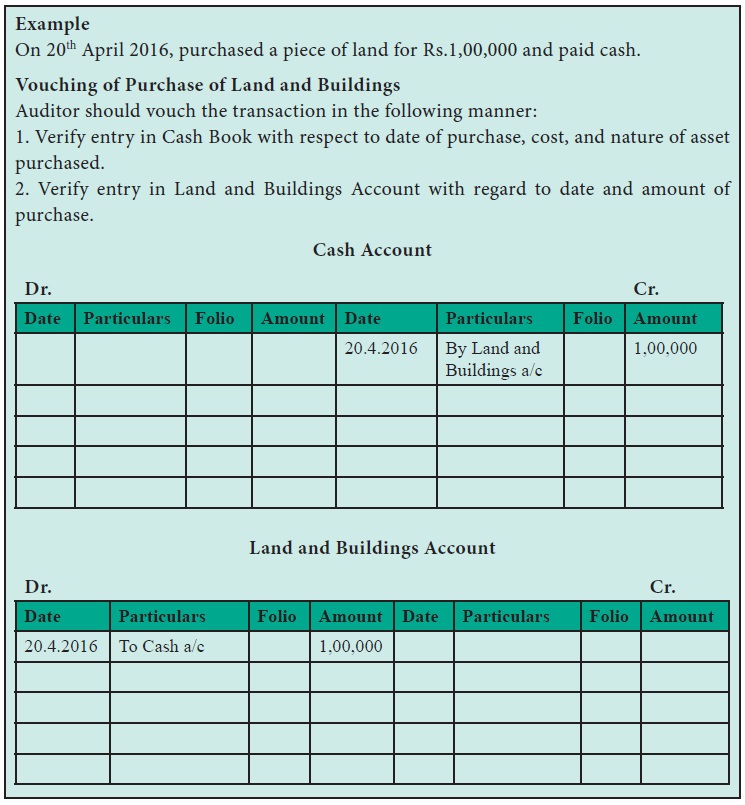Vouching of Cash Transactions | Auditing - Capital Expenditure | 11th Auditing : Chapter 6 and 7 : Vouching of Cash Transactions
Chapter: 11th Auditing : Chapter 6 and 7 : Vouching of Cash Transactions
Capital Expenditure
Capital Expenditure
Capital expenditure is the amount spent on
acquisition of fixed assets which include purchase of (1) Land and Buildings,
(2) Plant and Machinery, (3) Motor Vehicles, (4) Investments and (5) Patents
and copyrights. The procedures in vouching various items of capital expenditure
are as follows:
Purchase of Land and Buildings
Auditor should examine the title deeds and sale
agreements of the property purchased.
When assets are purchased on leasehold basis, lease
agreement should be verified with regard to lease rent, period, terms etc. In
case of purchase of freehold asset, auditor should examine the correspondence
directly from the seller. He should ensure that all expenses incurred in
connection with purchase of a asset like auctioneers commission, brokerage,
architects fees, registration fees and legal charges, are capitalized. He
should also vouch all such payments with reference to receipts. When asset is
purchased through broker, the auditor should verify the brokers note. When
asset is purchased in auction, the account submitted by the auctioneer should
be examined. Similarly, auditor should ensure that all expenses incurred in
connection with construction of a building like materials purchased, wages
paid, cartage has been capitalized. In case of construction of a building,
auditor should examine the construction contracts and architects certificate.
Documents to be Vouched: (1) Title
Deeds, Sale Agreements, (2) Lease Agreement, (3) Correspondences with Seller,
(4) Auctioneers Statement, (5) Architects Certificate, (6) Contractors
Agreement, (7) Receipts.
Example
On 20th April 2016, purchased a piece
of land for Rs.1,00,000 and paid cash.
Vouching of Purchase of Land and Buildings
Auditor should vouch the transaction
in the following manner:
1. Verify entry in Cash Book with
respect to date of purchase, cost, and nature of asset purchased.
2. Verify entry in Land and Buildings
Account with regard to date and amount of purchase.

Purchase of Plant and Machinery / Furniture And Fixtures
When plant and machinery are purchased, auditor
should vouch the invoices and receipts received from the vendors. He should
ensure that all incidental charges connected with the asset are capitalized and
added with the cost of asset. He should also carefully scrutinize that expenses
in connection with repairs and maintenance are not capitalized. When the asset
is purchased on Hire purchase, he should verify the Hire purchase agreement and
related vouchers. When the asset is purchased on Auction, Auctioneers statement
of account should be verified. In case of purchase of imported machinery, any
import duty and clearing charges should be debited to asset account.
Documents to be Vouched:
(1) Invoice from Vendors, (2)
Receipts, Auctioneers Statement of Account, Hire Purchase Agreement.
Purchase of Motor Vehicles
Contract of purchase, invoice, broker’s note,
payee’s acknowledgement, asset receiving report and the registration book
showing the ownership in the name of the client should be examined.
Documents to be Vouched:
(1) Invoice, (2) Contract of
purchase, Registration book, (4) Brokers note and (5) Payees acknowledgement.
Purchase of Investments
Auditor should vouch payments made for purchase of
Investments with the Brokers Bought Note. He should verify that investments
purchased are properly authorized and registered in the name of the company. He
should physically examine the actual investment held by the company. In case of
new issue of securities, auditor should examine letters of allotment, bank
receipt for installments paid, share certificates etc. If investments are
purchased cum-dividend, auditor should verify that the expenditure has been
properly apportioned between capital and revenue. In case of inscribed stock,
certificate from the bank in whose books the stock is inscribed should be
obtained.
Documents to be Vouched:
(1) Brokers Bought Note, (2) Schedule
of Investments, (3) Share certificate, (4) Letters of Allotment and Bank
Receipt, Bank Certificate for Inscribed Stock.
Purchase of Patents and Copyrights
Patent is an exclusive right or privilege to make
or produce something and copyright is a right to produce an item of aparticular
design. Incase of purchase of patents and copyrights, auditor should obtain the
patents and copyrights list from the client and examine it with reference to
registration number, date, name of the seller, consideration paid etc. He
should verify the registration certificates, certificates for grant of patent,
documents of assignment, copyright agreements and receipt for renewal fees.
When patent is purchased through broker, brokers commission should be accounted
as capital expenditure and should be included in the cost of patent. Similarly,
when patents are received through research, research expenses should also be
capitalisied. On the other hand, he should ensure that renewal fees paid should
be not be capitalized but instead should be treated as revenue expenditure. He
should also ensure that lapsed patents have been written off from the books of
accounts.
Documents to be Vouched:
(1)List of Patents and Copyrights,
(2) Patent and Copyright Agreement, (3) Registration Certificates, (4) Document
of Assignment, (5) Receipts.
Related Topics